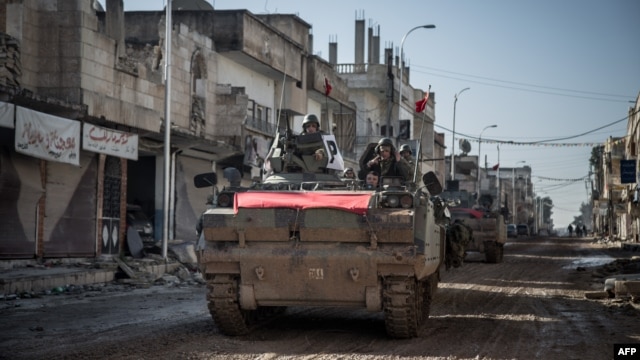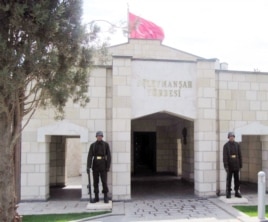 Damascus is calling a Turkish military operation in northern Syria to evacuate dozens of troops and relocate a historically significant tomb an act of «flagrant aggression.»
Damascus is calling a Turkish military operation in northern Syria to evacuate dozens of troops and relocate a historically significant tomb an act of «flagrant aggression.»
Ankara dispatched tanks, heavy weaponry, and hundreds of military personnel across the border late Saturday to rescue nearly 40 Turkish soldiers tasked with protecting the remains of Suleyman Shah, grandfather of the Ottoman Empire’s founder, as Islamic State militants surrounded the area in recent months.
Turkish Prime Minister Ahmet Davutoglu described the operation as a success. He said the Turkish forces had been given a directive to protect the country’s spiritual values and the safety of armed forces personnel.
«At 9 o’clock two simultaneous operations started. First, our troops entered Syria through Mursitpinar (border crossing), and headed for Karakozak village (in Syria), and started the operation to reach Suleyman Shah’s tomb, Davutoglu said.
«At the same time, 9.02, another tank and troop unit entered Syria through Esme, and controlled a nearby territory for the new holy place of the tomb of Suleyman Shah, and raised our flag at 9.02 in this territory in Syria,» he added.
Turkish territory
The tomb, which is about 35 kilometers into Syria in Aleppo Province, is on Turkish territory based on a treaty signed in 1921. The area is under Islamic State control, but no clashes were reported. One soldier died in what was described as an accident.
The force was reported to have returned to Turkish territory Sunday.
Citing a Foreign Ministry official, Syrian state news agency SANA reported that the operation proves Ankara’s «close connection with terrorist organizations operating in the area,» since the tomb was unharmed amid other attacks by militants on mosques, churches and tombs across the country.
Despite the Islamic State group fighting Kurdish forces within kilometers of the Turkish border, Ankara had not sent ground forces into Syria, where a crippling civil war and an ongoing Islamic State land grab have up-ended the country.
Damascus warned that the rescue operation was conducted without permission, in violation of an agreement, and that Turkey would be held responsible for the «repercussions of this aggression.»
Turkey says it informed the Syrian government of the operation, but did not seek approval.
«No permission was taken (from anyone). The decision was taken and the order was given by the government of the Turkish Republic, approved by the president (Turkish President Recep Tayyip Erdogan) and applied by Turkish armed forces,» Davutoglu said.
«But firstly, the Free Syrian Army and then all the sides, and coalition forces, were informed after the start of the operation to prevent civilian casualties,» he added.
New site for historical remains
The tomb will be relocated closer to the Turkish border, on land Davutoglu said troops commandeered overnight. The previous location was demolished to prevent militants from using the facility.
But Ankara is facing domestic rancor from opposition politicians over the decision to remove the guards and relocate the tomb.
According to the Turkey’s Hurriyet Daily News, Republican People’s Party (CHP) chair Kemal Kilicdaroglu said on social media that the operation was tantamount to retreating.
“The government that bowed before terrorists and sold the homeland’s soil has showed that its first job will be running away from other threats that will be faced tomorrow,” Kilicdaroglu wrote Sunday.
History of tomb
This is not the first time the tomb has been transplanted. In the 1970s, it was moved due to flooding when the Euphrates was dammed.
Despite the ongoing civil war, Ankara has ruled out relinquishing its rights under the treaty, insisting it would always protect all Turkish territory wherever it is.
Suleyman Shah was the grandfather of Osman I, founder of the Ottoman Empire. He is believed to have drowned in the Euphrates River in what is now modern-day Syria.
Saturday’s intervention came as concern was growing that the soldiers guarding the outpost might be captured by Islamic State forces.
Last year, nearly 50 Turkish diplomats were kidnapped when the jihadists seized control of Mosul, Iraq’s second city. The diplomats were eventually released in exchange for captured Islamic State members held in Turkey.
Dorian Jones contributed to this report from Istanbul.
http://www.voanews.com/content/turkey-syria/2653766.html



